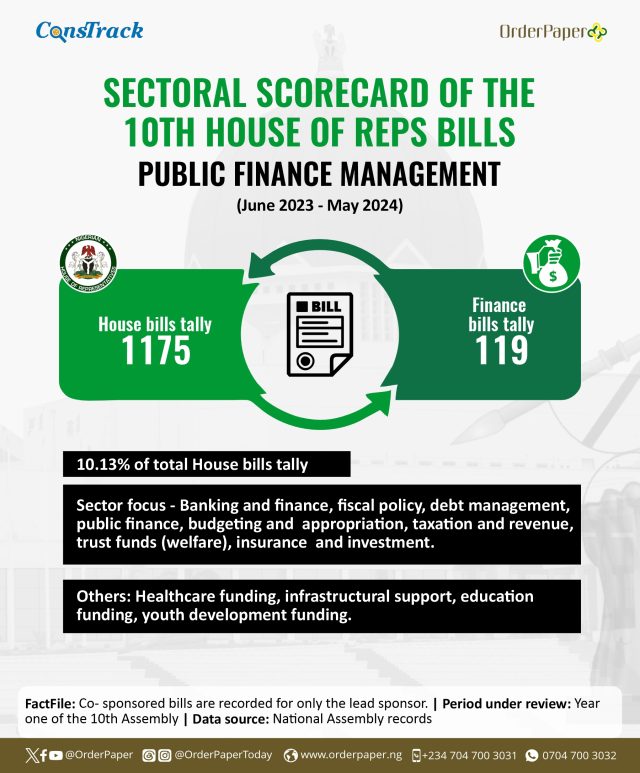Public Finance Management bills represent 10.1 percent of the 1,175 bills processed during the inaugural year of the 10th House of Representatives.

Public Finance Management (PFM) encompasses the processes through which governments plan, allocate, and oversee public resources effectively. It involves the entire budget cycle, including revenue collection, expenditure management, and accountability measures.
In the past year, a total of 119 bills specifically addressing PFM were introduced in Nigeria’s House of Representatives, aimed at enhancing the management of public finances across the nation.
These legislative proposals covered a wide range of topics, including banking and finance, fiscal policy, debt management, public finance, budgeting and appropriation, taxation and revenue generation, insurance, investment as well as trust funds for welfare.
Additionally, they addressed critical areas such as healthcare funding, infrastructural support, education financing, and youth development initiatives.
READ ALSO: 10THNASSREPORTCARD: Senate gets 53 finance and economy bills in 1st year
Despite these legislative efforts, Nigeria’s PFM system grapples with several challenges that hinder its effectiveness. Key issues include weak institutional frameworks, pervasive corruption and mismanagement, lack of transparency, and inadequate budgeting processes. These challenges not only undermine fiscal discipline but also impede accountability and efficient use of public funds—elements that are crucial for sustainable development.
The Significance of Public Finance Management
The importance of PFM lies in its role in fostering fiscal discipline and accountability. By establishing clear mechanisms for resource mobilization and allocation, PFM helps governments prioritize spending according to national needs and policy goals. This systematic approach not only enhances operational efficiency but also builds public trust in government institutions by demonstrating responsible management of taxpayer money.
Effective PFM is essential for ensuring that public funds are used efficiently and transparently, which ultimately supports the delivery of quality public services and promotes sustainable economic growth.
To foster economic stability and growth, it is imperative for Nigeria to strengthen its PFM practices. This can be achieved by tackling corruption head-on, enhancing transparency in financial dealings, and improving institutional frameworks.
By optimizing resource allocation and ensuring that public funds are utilized effectively to meet the needs of its citizens, Nigeria can build a more resilient economy. Beyond proposing reforms, a continued commitment to these reforms is essential for restoring trust between the government and the populace while promoting sustainable development across the country.
10th NASS Report Card: Read up on the performance of other senators and members of house and other specialized categories here



